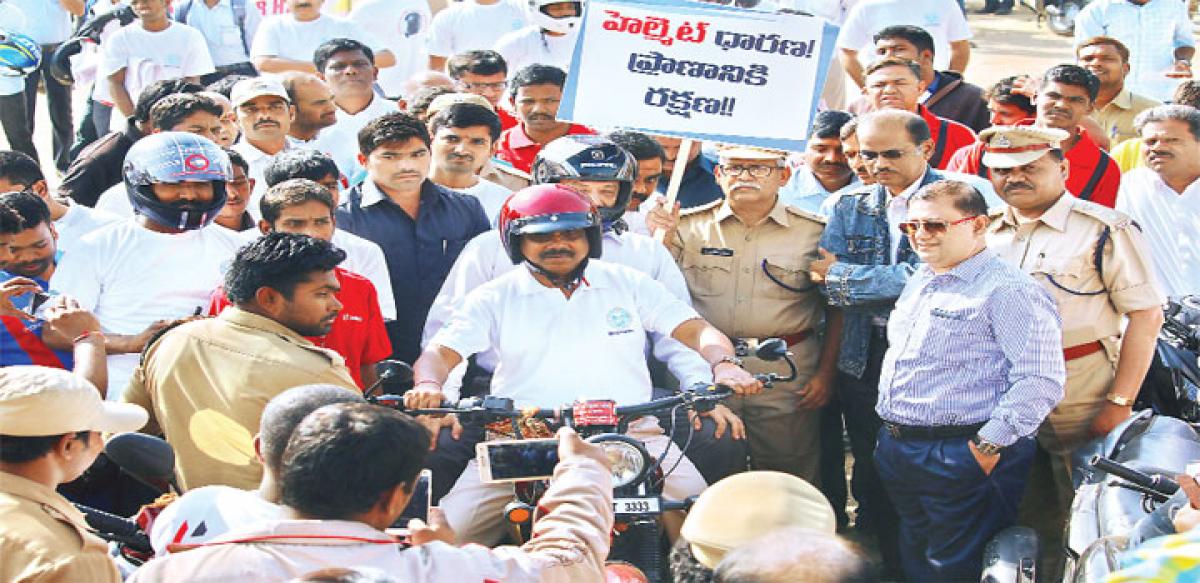Live
- Indian students' concerns about employment, safety, and visas discourage them from applying to UK universities
- Candlelight Concerts Makes a Dazzling Debut in Hyderabad with Sold-Out 'Tribute to Coldplay' Show
- Shubman Gill Sustains Thumb Injury Ahead of Perth Test; Devdutt Padikkal Joins Test Squad
- Unlock Loot Boxes, Diamonds, Skins, and More Exciting Rewards with Garena Free Fire Max Redeem Codes for November 16
- Regarding the DOGE Plan, Vivek Ramaswamy stated, "Elon Musk and I Will Take a Chainsaw to Bureaucracy"
- Sudanese army says repulsed paramilitary forces attack in western Sudan, killing over 80
- Jaipur Open 2024: Baisoya makes a grand comeback to clinch title in marathon playoff against Rashid Khan
- Jamaat-e-Islami Hind President asks cadre to reach out to larger society beyond community
- Why PM mum on Caste Census, removing 50 pc quota limit: Rahul Gandhi
- Barrackpore Municipality Vice-Chairman found dead at home, suicide note suggests blackmail
Just In

Curtains came down on the 27th National Road Safety Week on Tuesday with numerous initiatives and programmes taken up by the automobile industry and other stakeholders towards making the roads safer. The theme for the road safety week 2016 was, “Road Safety – Time for Action.”
Curtains down on the 27th National Road Safety Week
Curtains came down on the 27th National Road Safety Week on Tuesday with numerous initiatives and programmes taken up by the automobile industry and other stakeholders towards making the roads safer. The theme for the road safety week 2016 was, “Road Safety – Time for Action.”
Indian Federation for Road Safety (IFROS) in collaboration with Telangana Police conducted a helmet campaign at People’s Plaza to commemorate the event. The campaign was inaugurated by Rajiv Sharma, Chief Secretary, Telangana.
Also present at the event were City Police Commissioner Mahender Reddy, Addl CP (Traffic) Jitender, Addl DGP (Road Safety) Krishna Prasad, Transport Commissioner Sandeep Kumar Sultania, Principal Secretary (R & B) Sunil Sharma, Vinod Kanumala, founder of IFROS and others representing the Transport Department.
Over the week, TSRTC, traffic, Telangana police and legal experts and those representing commuters counselled drivers, conductors and mechanical staff in garages on road safety. Special medical camps were conducted and special training classes were held on safety driving at Zonal Staff Training colleges of the RTC with special emphasis on maintenance.
In the national front, Society for Indian Automobile Manufacturers (SIAM), Society of Automotive Fitness and Environment (SAFE) brought to life several activities in collaboration with its members and traffic police of various states.
Talking about the initiatives, Vishnu Mathur, Director General, SIAM said, “SIAM-SAFE with the full support from members will organise programmes across 4200 automobile dealers network all across the nation and also will organise various training workshops, competitions, walk for students, drivers and general masses with an objective of reducing fatalities on our roads.”
Companies like Ashok Leyland Ltd, Bajaj Auto Ltd, Fiat India Automobiles Pvt. Ltd, General Motors India Pvt. Ltd, Eicher Ltd, Hero MotoCorp Ltd, Honda Motorcycle and Scooter India Pvt. Ltd, Honda Cars India Ltd, Mahindra & Mahindra Ltd, Mahindra Two Wheelers Ltd, Maruti Suzuki India Ltd, Renault India Pvt Ltd, SKODA AUTO India Pvt Ltd, Volkswagen India Pvt Ltd, VE Commercial Vehicles Ltd, Volvo Buses, Tata Motors Ltd, TVS Motor Company Ltd, Toyota Kirloskar Motor Pvt. Ltd and Yamaha motor Pvt. Ltd took active participation in the awareness events.
The events focused on measures such as the need for wearing helmets, avoiding drunk driving, use of cell phone while on wheels, wearing of seat belts, use of dazzling head lights, and compliance to road rules. There were several other workshops which were organised for focused groups like the cab drivers and auto rickshaw drivers.
Apollo during its EMCON (Emergency Care Conference) had Paediatric Care and Air Ambulances as its new initiative. “This is because many Villages are not well connected to cities. Emergency care is a problem. Many accidents happen on Highways and Rural areas rather than in Cities.
In Hyderabad, Apollo has its emergency care that is managed by using a ‘Hob and Spoke model’, where many centres are interconnected for delivering best skill and expertise. The speciality of the programme is that doctors who have just completed their MBBS are entrusted with the Emergency Care programme to let them be specialists in this field.
There are only a few hospital groups all throughout India which can boast of such a facility and Apollo happens to be the pioneer among them,” shared a release from Apollo. The Global status report on road safety 2015, reflecting information from 180 countries, indicates that worldwide the total number of road traffic deaths has plateaued at 1.25 million per year, with the highest road traffic fatality rates in low-income countries, including India.
In the last three years, 17 countries have aligned at least one of their laws with best practice on seat-belts, drink–driving, speed, motorcycle helmets or child restraints. While there has been progress towards improving road safety legislation and in making vehicles safer, the report shows that the pace of change is too slow.
“Urgent action is needed to achieve the ambitious target for road safety reflected in the newly adopted 2030 Agenda for Sustainable Development: halving the global number of deaths and injuries from road traffic crashes by 2020,” Vishnu Mathur added.

© 2024 Hyderabad Media House Limited/The Hans India. All rights reserved. Powered by hocalwire.com







